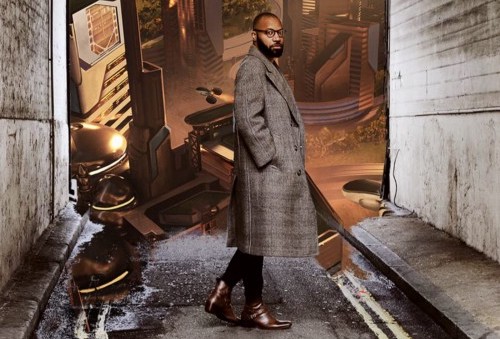It’s February 2020.
SaVonne just resigned from her full-time job to finally dedicate her time to growing her business, Aya Paper Co., an eco-friendly card company. She would rush from one event to another, hopes still intact, completely oblivious to what the next month would bring.
Quetzal, 3,000 miles away in California, had his whole year planned out. The formally trained violinist and musician — with the stage name QVLN — had a west coast tour lined up and international gigs scheduled for Europe and northern Africa.
Jason was in the zone, creating the world of Andromeda, where freedom is delicate; time is scarce; and the apocalypse is nearing. Little did he know that reality would eerily resemble fiction all too soon.
In March, the Western world woke up to the global coronavirus pandemic ravaging the East, and everything was put on hold. For most of us, it was as if the world stood still for a moment. The silence was deafening.
Over the last year, Take Creative Control created “The Series” to better understand how creators of color – independent artists, musicians, entrepreneurs, and small business owners – have had to adapt during the pandemic. We collected dozens of stories. Here are five things we learned.
One. Old challenges reared their ugly heads.
There were definitely new challenges that forced our community to be nimble but underlying, and often ignored, issues were exacerbated during the pandemic. Access to capital has long been an issue for Black and brown entrepreneurs, and it is even worse for Black women. Financial relief during the pandemic was scarce for our community. Most small businesses were left to fend for themselves or lean on their friends and families. Unfortunately, many small businesses, restaurants, mom-and-pop stores closed their doors. The pandemic forced the closure of 41 percent of Black-owned businesses, compared to only 17 percent of white-owned businesses. These closures, inevitably, caused destabilizing ripple effects for families and communities.
Two. Technology continues to be a double-edged sword for the arts community.
On one-hand, technology was the only way for artists, like Quetzal, to get their music out during the pandemic. With the advancement of technology and the ingenuity of Black and brown artists, we saw the rise of “Club Quarantine,” “Verzuz,” and other virtual experiences that brought us together despite social distancing. But the costs associated with the digital music industry can be high for those new to the business and with fewer resources. Sharing music online is easy enough, but who pays the artists? It was only fitting that the Music Modernization Act (MMA), passed by Congress in 2018, went into effect during the pandemic. The MMA created the Mechanical Licensing Collective (MLC), which grants a blanket license to music services and collects royalties from streaming services, such as Spotify and Apple Music. The MLC then distributes them to the copyright owners or songwriters. This historic law is a key step forward to better regulating the digital music industry. While there is more to be done, the MLC is crucial to ensuring artists get paid for their work when streamed online.
Three. Black and brown voices continue to be disproportionately silenced online.
At the height of the pandemic, when the coronavirus was disproportionately killing Black and brown people, we took to the streets anyway to fight another disease: racism. The murders of Ahmaud Arbery, George Floyd, Breonna Taylor, and so many more were too much for our community to bear. Yet, what we soon learned was that the social media platforms we relied on to get out our message, organize our efforts, and reach new allies had been silencing our voices. For years the far-right has been crying wolf, claiming to be unfairly targeted online, but the reality is that Black and brown voices are constantly targeted. And it hasn’t been restricted to Black Lives Matter messages; even our music and our content (here’s looking at you, TikTok) is unfairly flagged and often taken down with little explanation. The question we are left with is “can algorithms be racist?” Turns out, the answer is yes.
Four. It’s Amazon’s world; we’re just living in it.
When the stores shut down, we all turned to Amazon. Need toilet paper? Amazon. How about a ring light for your zoom calls? Amazon. Want to update your home office? Amazon. Want to sell an e-book, since all the bookstores are closed? Amazon. Amazon has its hands in almost every industry. And if they do not now, they will soon. The convenience of Amazon is nice for the consumer, to a point, but challenges arise when the government does not adequately regulate their practices — many of which go against workers’ rights, antitrust laws, and just downright fairness. The top five most valuable companies in America today are all Big Tech — Amazon, Apple, Facebook, Google, and Microsoft. Their tactics often fail the gut check of fairness and equity. Our antitrust laws are extremely antiquated (some of which are over 100 years old), and if we are to apply them to the digital world, well, things get murky. Many small businesses and independent authors have to find a way to work with these giants, with little room for recourse or even negotiation.
Five. There is power in the collective.
The idea of collective action, unions or cooperatives are foreign to many in our generation. We mocked Hillary Clinton’s slogan “Stronger Together.” We did not grow up with unions. We did not engage in collective action. And cooperatives are only found in bougie neighborhoods, like Park Slope. But, this pandemic has shown us that we really are stronger together. Unions can be tools for higher wages and better working conditions. Collective action helped feed our children and families when schools closed. It helped keep small restaurants in Chinatown open, when racism and the pandemic hit on multiple fronts. Cooperatives can be an opportunity for wealth-building. This past year, we saw America sprint toward authoritarianism, but one thing we could count on was our collective action. We stayed home and did our part during the pandemic to keep our neighbors safe. We clapped for our health workers; we thanked our local grocery store workers; we liked and shared content from our favorite creators who kept us entertained. Our work is not done and the pandemic is far from over. But, I am forever grateful to our creative community, for keeping us sane during this crazy time.


